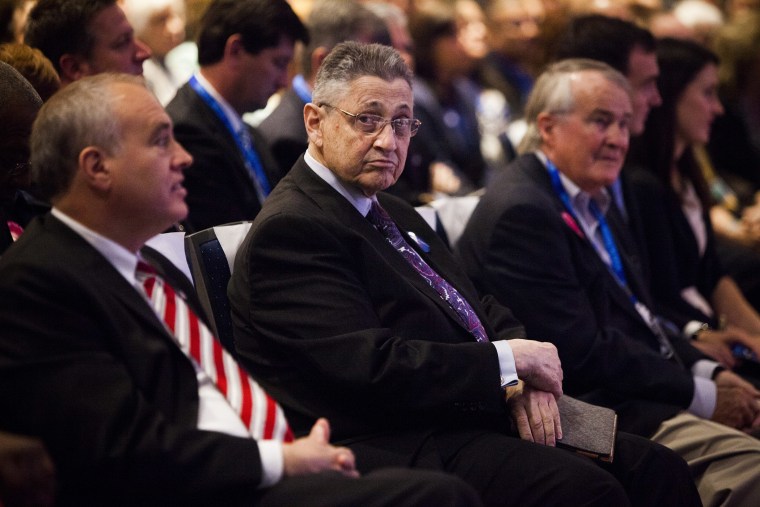Federal authorities arrested one of New York state’s most powerful Democrats on Thursday on corruption charges, alleging that he accepted millions of dollars of bribes and kickbacks since 2000.
"Politicians are supposed to be on the people’s payroll, not on the payroll of wealthy special interests they do favors for," U.S. Attorney Preet Bharara told reporters Thursday afternoon.
Sheldon Silver, speaker of the New York State Assembly, turned himself into the FBI in downtown Manhattan where he was arrested, a law enforcement source told NBC News. He'll appear in court Thursday afternoon.
He's being charged with defrauding voters by accepting millions of dollars in bribes, Bharara said, describing a scheme where Silver monetized his office, using attorney referral fees to garner millions "without doing a lick of work" and funneling state money towards members of this scheme. Since 2002, the speaker accepted more than $6 million in outside income; Bharara said $4 million of those were believed to be graft.
"Silver used the power and influence of his official position to obtain for himself millions of dollars in bribes and kickbacks masked as legitimate income," the complaint said.
Just shy of being the longest-serving speaker in Assembly history, Silver has been a key power broker in Albany for decades and is arguably one of the most powerful state-level legislators in the country, with a heavy hand in deciding how the state spends its hefty annual budget which totaled $133 billion last year.
The arrest and subsequent proceedings will likely scramble Albany’s new legislative session and upend a power hierarchy that’s been in place for decades. News of the arrest trumped Gov. Andrew Cuomo's agenda and budget proposal on the front page of The New York Times, who first reported the arrest.
It could also mark a new era for a state capital that’s struggled with corruption for decades. Advocates thought they’d hit a breaking point when Gov. Andrew Cuomo announced an anti-corruption commission in 2013, but he hamstrung it for investigating his political allies and unexpectedly shuttered it early last year. Federal investigators picked up where the commission left off, seeking out wrongdoing in legislators' outside income.
The attorney said that not only did Silver accept bribes, he lied about it, too.
"In response to recent questions, the speaker had his spokesperson state that none of Silver’s clients had any business in front of the state," he said. "It would be hard to find a more blatant falsehood, as Silver was employed by one of the largest developers in the state."
Bharara -- known for his work prosecuting corruption and insider trading -- is leading the investigation. He's no stranger to politics -- he's also investigating New Jersey Republican Gov. Chris Christie's Bridgegate scandal and was considered a potential replacement for Attorney General Eric Holder, though the president eventually picked Loretta Lynch for the job.
Silver, 70, was elected in 1976 and named speaker in 1994, where he took a key role negotiating bills and hammering out budgets with the Senate majority leader and governor in back rooms. He earned a reputation as an unmovable force in the capital, while governors came and went and other legislators were felled by political blunders. Silver's office has not yet commented on details of the arrest. Investigators declined to comment on proceedings to NBC News.
State lawmakers are legally allowed to serve during investigation and even after an arrest, but if they are convicted of felony charges they must leave office.
"Those who make the laws don't get to break the laws," said Richard Frankel, the FBI agent in charge of the investigation.
